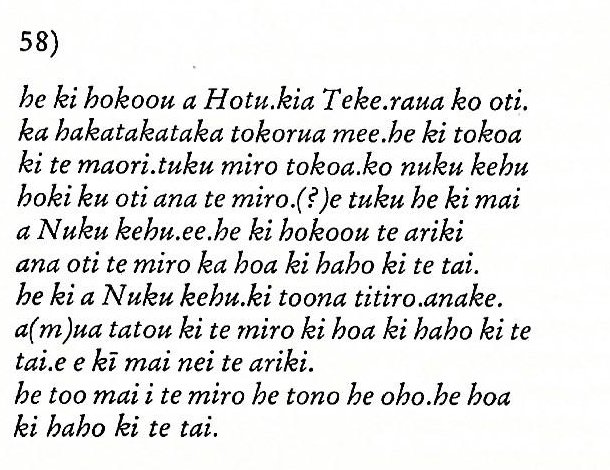
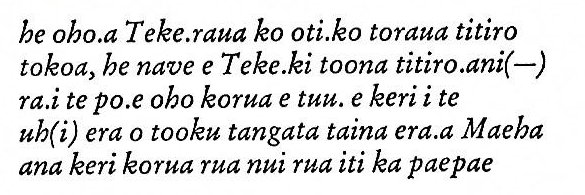
|
he tuu ki te tau i a
Hotu.he ki a Matua |
Hotu's time
came [he tuu ki te tau i a Hotu], and Matua
spoke to Hotu, 'Put the canoe (miro) into the
water and sail to Te Pito O Te Kainga. For five
months Ira has been searching for the land. Ira went
away and did not return [hoki mai nei a Ira].'
|
|
kia Hotu.ka
hoa te miro ki
haho ki te tai ka |
|
oho.ki te pito o te
kainga.karima.mara(-) |
|
ma o Ira.ki tikea ana te kainga.e Ira.i o(-) |
|
ho era.e tae. hoki mai
nei a Ira. |
| Hoa.
1. Master, owner; tagata hoa papaku,
owner or relative of a dead; hoa manu, 'bird
master', that is, he who received the first egg at
the annual festivals in Orongo; he to'o
mai e te hoa manu i te mamari ki toona rima, he
ma'u, he hoko, the 'bird master' receives the
egg in his hand and carries it, dancing. 2.Friend,
companion: e ga hoa ê! 3. To cast
away, to throw away, to abandon,
perhaps also to expel. 4. To confess a
sin; he hoa i te ta'u: term used of a
category of rongorongo boards (see ta'u).
Vanaga. 1. Friend; repa hoa, friend
(male), comrade, companion, fellow; to confide;
repa hoa titika, faithful friend; garu hoa,
friend (either sex); uha hoa, friend
(female); hoa kona, native T. 2. To abandon,
to debark, to cast, to launch, to anchor, to let go,
to give up, to reject, to repudiate, to suppress, to
cut off, to jerk out, to proscribe, to reprove;
hoahoa, to upset, to destroy. Churchill.
Haho. Outside. Vanaga. Hahoa (ha
causative, hoa) to cut, to wound, to hurt. PS
Mgv.: tahoa, to make papyrus by beating. Sa.:
foa, to chip, to break. To.: foa, to
crack, to make an opening. Fu.: foa, to dig,
the rent in a mat. Underlying the Nuclear Polynesian
significations the primal sense seems to be that of
a hole. The Rapanui, a causative, is a clear
derivative in the cutting sense; wound and hurt are
secondary withing this language. The Mangarevan
composite means 'to beat until holes appear', which
is a distinctive character of the beaten bast of the
paper mulberry in the condition in which it is ready
for employment in making tapa. Churchill.
|
|
E:56 → Alcyone
... another Alcyone, daughter
of Pleione, 'Queen of Sailing', by the oak-hero
Atlas, was the mystical leader of the seven Pleiads.
The heliacal rising of the Pleiads in May marked the
beginning of the navigational year; their setting
marked its end when (as Pliny notices in a passage
about the halcyon) a remarkably cold North wind
blows ... |
|
he ki hokoou mai a
Matua kia Hotu |
Then Matua
said to Hotu, 'Launch the canoe [ka hoa te miro],
gather [ka too toou] the people, and sail on
board the canoe [ka oho.irunga i te miro] to
Te Pito O Te Kainga.
Sail on [ka oho] and let children be born
[ka hakatama toou] by the many in Te Pito O
Te Kainga (i.e., the number of your subjects will
increase in the new homeland).
Not one thing [he mee. o toe a etahi]
shall remain behind (i.e., everything that is needed
will be taken along) when you leave [ana oho koe]!' |
|
ka hoa te miro.ka too
toou o te tangata |
|
ka oho.irunga i te
miro.ki te pito o te |
|
kainga.ka oho.ka
hakatama toou o te
piere |
|
tangata.i te pito o te
kainga.he mee. o toe a |
|
etahi.ana oho koe. |
|
Tama. 1.
Shoot (of plant), tama miro, tree shoot;
tama tôa, shoot of sugarcane. 2. Poles, sticks,
rods of a frame. 3. Sun rays. 4. Group of people
travelling in formation. 5. To listen attentively
(with ear, tariga, as subject, e.g. he
tama te tariga); e-tama rivariva tokorua
tariga ki taaku kî, listen carefully to my
words. Tamahahine, female. Tamahine (=
tamahahine), female, when speaking of
chickens: moa tamahine, hen. Tamâroa,
male. Vanaga. 1. Child. P Pau.: tama riki,
child. Mgv.: tama, son, daughter, applied at
any age. Mq.: tama, son, child, young of
animals. Ta.: tama, child. Tamaahine (tama
1 - ahine), daughter, female. Tamaiti,
child P Mq.: temeiti, temeii, young
person. Ta.: tamaiti, child. Tamaroa,
boy, male. P Mgv.: tamaroa, boy, man, male.
Mq.: tamaóa, boy. Ta.: tamaroa, id. 2.
To align. Churchill. In the Polynesian this [tama
na, father in the Efaté language] is
distinguished from táma child by the accent
tamā or by the
addition of a final syllable which automatically
secures the same incidence of the accent,
tamái,
tamana ...
Churchill 2.
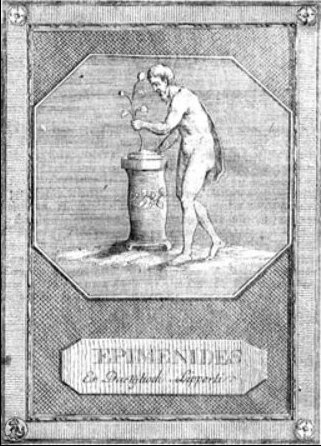
Kai toe kai tohe etahi, omitted nothing
whatsoever (E:13). |
|
he ki a Hotu.ki toona
titiro.kia Teke.kia |
Hotu said
to his assistants [ki toona titiro] Teke and
Oti, 'Go and take banana shoots, taro seedlings,
sections of sugarcane to be planted, yam roots,
sweet potatoes with leaves (? rau kumaru),
hauhau trees, paper mulberry trees, sandalwood
trees, toromiro trees, ferns (riku),
rushes, yellow roots, tavari plants, moss (para),
and ngaoho plats. Take all of these things [anakenake
te mee] (i.e., all varieties of plants) and also
grass [te mauku tokoa]!'
|
|
oti.ka oho.korua ka too
mai i te huri maika |
|
i te uru taro.i
tepupura toa.i te uhi.i te rau. |
|
kumara.i te hauhau.i te
mahute. i te naunau. |
|
i te toromiro. i te
riku.i te ngaatu. i te pua.i te |
|
tavari.i te para. i te
ngaoho. anakeanake te me(-) |
|
e.ana too mai koe.te
mauku tokoa. |
|
Tiro. Mgv.:
Spots on linen. Ta.: tiro, to mark. Mq.:
tiotioa, blotched, covered with white spots.
Titiro, to admire. P Ma.: tiro, to gaze
at. Churchill. Vi.: tiro, siro,
sisiro, to descend, to go down a steep or hill.
Churchill 2.
Pua mouku, grass. Churchill.
Uku koku is
the name of a dark type of grass, which in earlier
times was used to make hats. Barthel 2.
 |
| Sa.:
malae, the town green. Nukuoro: malae, a
cleared space, an open place, a plantation. To.:
malae, a gree, a grass plot ... Ha.: malae,
smooth (as a plain) ... Ma.: marae, an
inclosed place in front of a house. Ta.: marae,
the sacred place of worship ... Vi.: mara, a
burying place ... In note 261 I have advanced the
opinion that malae is in form a conditional
derivative of lae. This holds of the
signification found in Nuclear Polynesia. The
secondary sense which the Tongafiti carried to
eastern Polynesia has obscured the lae
element; but the sacrosanct content of the marae
in the four-godded theology of eastern Polynesia is
after all but a logical outgrowth of the Nuclear
Polynesian malae as the civic center of
social life where god is sole, surpreme - and
Lucretian ... Churchill 2.
... What happens after (or
happened, or will happen sometime, for this myth is
written in the future tense), is told in the
Völuspa, but it is also amplified in Snorri's
Gylfaginning (53), a tale of a strange encounter
of King Gylfi with the Aesir themselves, disguised
as men, who do not reveal their identity but are
willing to answer questions: 'What happens when the
whole world has burned up, the gods are dead, and
all of mankind is gone? You have said earlier, that
each human being would go on living in this or that
world.' So it is, goes the answer, there are several
worlds for the good and the bad. Then Gylfi asks:
'Shall any gods be alive, and shall there be
something of earth and heaven?' And the answer
is: 'The earth rises up from the sea again, and is
green and beautiful and things grow without sowing.
Vidar and Vali are alive, for neither the sea nor
the flames of Surt have hurt them and they dwell on
the Eddyfield, where once stood Asgard. There come
also the sons of Thor, Modi and Magni, and bring
along his hammer. There come also Balder and Hoder
from the other world. All sit down and converse
together. They rehearse their runes and talk of
events of old days. Then they find in the grass the
golden tablets that the Aesir once played with
...

13 * 13 - 4 = 165. And 165 -
13 (the white pieces above) = 152 (= 8 * 19) - as in
Te Maro 1 when the Sun reached Castor and the
Explorers reached the new land.
|
1 |
Banana
shoots |
te huri maika |
|
2 |
Taro
seedlings |
te uru taro |
|
3 |
Sections of Sugarcane |
tepupura toa |
|
4 |
Yam
roots |
te uhi |
|
5 |
Sweet
potatoes |
te rau kumara |
|
6 |
Hauhau
trees |
te hauhau |
|
7 |
Paper
Mulberry trees |
te mahute |
|
8 |
Sandalwood trees |
te naunau |
|
9 |
Toromiro trees |
te toromiro |
|
10 |
Ferns |
te riku |
|
11 |
Rushes |
te ngaatu |
|
12 |
Yellow
roots |
te pua |
|
13 |
Tavari
plants |
te tavari |
|
14 |
Moss |
te para |
|
15 |
Nga Oho
plants |
te ngaoho |
|
16 |
Grass |
te mauku tokoa |
|
The minimum distance of
a star from the Sun to become visible
again is 16º
and 16 / 360 * 365.25 = ca 16 days. |
|
|
E:57
... The original story was by
Diogenes Laertius, an Epicurean philosopher circa
early half third century, in his book On the
Lives, Opinions, and Sayings of Famous Philosophers.
The story is in Chapter ten in his section on the
Seven Sages, who were the precursors to the first
philosophers. The sage was Epimenides. Apparently
Epimenides went to sleep in a cave for fifty-seven
years. But unfortunately, 'he became old in as many
days as he had slept years'. Although according to
the different sources that Diogenes relates,
Epimenides lived to be one hundred and fifty-seven
years, two hundred and ninety-nine years, or one
hundred and fifty-four years. A similar story is
told of the Seven Sleepers of Ephesus, Christian
saints who fall asleep in a cave while avoiding
Roman persecution, and awake more than a century
later to find that Christianity has become the
religion of the Empire ...
 |
|
he ki hokoou te ariki a
Hotu.kia Teke.he mee |
Then King
Hotu said to Teke, 'Don't forget the four-legged
animals (manu vae eha - 'birds with four
legs'), also [tokoa] pigs (? kekepu),
chickens, and birds.' |
|
o
rehu te manu vae eha.te
kekepu tokoa |
|
te moa tokoa.te manu
tokoa. |
|
Rehu. 1.
Dust. P Mgv.: rehu, a cinder, coal, ashes.
Mq.: éhuahi, ashes. Ta.: rehu, ashes,
soot, any powder. 2. To omit, to forget, to faint.
Rehurehu, to omit, omission, lost to sight.
Hakarehu, to surprise. Rehua,
unintelligible. Churchill. Mgv.: rehurehu,
from early dawn to mid morning. Ta.: rehurehu,
twilight. Mq.: ehuehu, id. Churchill. Mq.:
ehu, to fall in bits. Ma.: rehu, to split
off in chips. Ehua, Ehuo, a large
constellation. Ma.: rehua, a star or planet,
probably Jupiter. Churchill.
Keke. To go down after reached its zenith
(of the sun): he-keke te raá. Kekeé,
to be lying on the ground, partly above it, to stick
out: ma'ea ke'e ke'e, stones sticking out of
the ground. Kékekéke, to rustle, to creak:
ku-kekekeke-áte hare i te to kerau, the house
creaked in the wind. Kekepu, animal mentioned
in ancient traditions, the flesh of which was eaten
in Hiva (also kepukepu). Kekeri,
to feel an indisposition of the stomach or the
bowels: he-kekeri te manava. Kekeú,
shoulder (according to others, shoulder-blade); used
also for 'arm'. Vanaga. Keke (ke),
other, distinct, special; hikohiko keke,
hide-and-seek; kekee (ke), irregular,
uneven, rough; ke avai, a superlative
expression; hinihini ke avai, ancient; ika
ke avai, abuse; kori ke avai, abuse;
maori ke avai, skilful, handy; pipiro ke avai,
disgusting odor; tupu ke avai, of swift
growth; ua ke avai, a shower of rain.
Keekee; niho keekee, long protruding
teeth. Churchill. Pau.: keke, armpit. Mgv.:
keke, id. Ta.: ee, id. Mq.: kaáke,
id. Ma.: keke, id. Churchill. Mgv.: keke,
to praise, to felicitate. Sa.: 'e'e, to pay
respect to. Ha.: ee, caressing, kind.
Kekei, sharp, harsh, of the voice. To.: keke,
to bleat. Ha.: eeina, to creak, to grate.
Churchill.
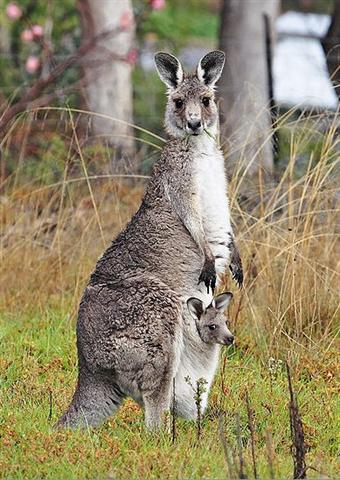
... At the time of the immigration, Hotu Matua
brought with him an animal that had short front legs
and fat, high buttocks ...
... The etymology of kangaroo is not known,
which allows me to imagine a connection with
Tagaroa (Kanaloa). The Polynesians surely
visited Australia on several occasions and the
striking pocket (little sack) on the front side of
the man-sized kangaroos (standing on 2 legs just
like men), must have stayed in their memories.
Nothing on land can be more illustrative of how life
must have begun inside a dark sack (taga) ... |
|
he ki hokoou te ariki a
Matua.kia Hotu. |
Then King
Matua said to Hotu, 'You must not forget [he mee
o rehu] the flies [te takaure] when you
take along (all the things that are necessary) and
sail off.
If you forget the flies [ana rehu i a koe te
takaure], the multitude (piere) of the
people will disappear [he ngaro]. When you
reach the land [ana tomo ki runga.ki tou kainga]
to which you are travelling [ena koe ka oho],
it will be over quickly (?) for the multitude of the
people.
When the flies die [ana moko te ihu o te
takaure], the human population dies too [he
moko tokoa te ihu o tou piere tangata].' |
|
he mee o rehu i a koe
te takaure.ana mau ana oho. |
|
koe.ana rehu i a koe te
takaure.he ngaro tou
piere. |
|
tangata.ana tomo ki
runga.ki tou kainga ena koe |
|
ka oho. ena ā ku mami
ana tou piere.tangata. |
|
ana moko
te ihu o te takaure.he
moko tokoa te |
|
ihu o tou piere
tangata. |
| I te
ahiahi-ata he garo te raá ki raro ki te vai kava.
In the evening the sun disappears under the sea.
Ihu. 1. Nose; ihu more, snub nose,
snub-nosed person. 2. Ihuihu cape, reef;
ihuihu - many reefs, dangerous for boats. 3.
Ihu moko, to die out (a family of which remains
only one male without sons); koro hakamao te mate
o te mahigo, he-toe e-tahi tagata nó, ina aana
hakaara, koîa te me'e e-kî-nei: ku-moko-á te ihu o
te mahigo, when the members of family have died
and there remains only one man who has no offspring,
we say: ku-moko-á te ihu o te mahigo. To
disappear (of a tradition, a custom), me'e ihu
moko o te tagata o te kaiga nei, he êi, the
êi is a custom no longer in use among the people
of this island. 4. Eldest child; first-born; term
used alone or in conjunction with atariki.
Vanaga. 1. Nose, snout, cape T (iju G). Po
ihuihu, prow of a canoe. P Pau.: ihu,
nose. Mgv.: ihu, nose; mataihu, cape,
promontory. Mq., Ta.: ihu, nose, beak,
bowsprit. Ihupagaha, ihupiro, to rap
on the nose, to snuffle. 2. Mgv.: One who dives
deep. Ta.: ihu, to dive. Churchill. Sa.:
isu, nose, snout, bill. Fu., Fakaafo, Aniwa,
Manahiki: isu, the nose. Nuguria; kaisu,
id. Fotuna: eisu, id. Moiki: ishu, id.
To., Niuē, Uvea, Ma.,
Ta., Ha., Mq., Mgv., Pau., Rapanui, Tongareva,
Nukuoro: ihu,
id. Rarotonga: putaiu,
id. Vaté: tus,
id. Viti: uthu,
nose. Rotumā: isu,
id. ... usu
and ngusu
... serve as transition forms, usu
pointing to
isu the nose in
Polynesia and ngusu
to ngutu
the mouth, which is very near, nearer yet when we
bear in mind that ngutu
the mouth is snout as well and that isu
the nose is snout too ... Churchill 2.
... From a religious point of
view, the high regard for flies, whose increase or
reduction causes a similar increase or reduction in
the size of the human population, is interesting,
even more so because swarms of flies are often a
real nuisance on Easter Island, something most
visitors have commented on in vivid language. The
explanation seems to be that there is a parallel
relationship between flies and human souls, in this
case, the souls of the unborn. There is a widespread
belief throughout Polynesia that insects are the
embodiment of numinous beings, such as gods or the
spirits of the dead, and this concept extends into
Southeast Asia, where insects are seen as the
embodiment of the soul
...
... Men's spirits were thought
to dwell in the Milky Way between incarnations.
This conception has been
handed down as an Orphic and Pythagorean tradition
fitting into the frame of the migration of the soul.
Macrobius, who has provided the broadest report on
the matter, has it that souls ascend by way of
Capricorn, and then, in order to be reborn, descend
again through the 'Gate of Cancer' ...
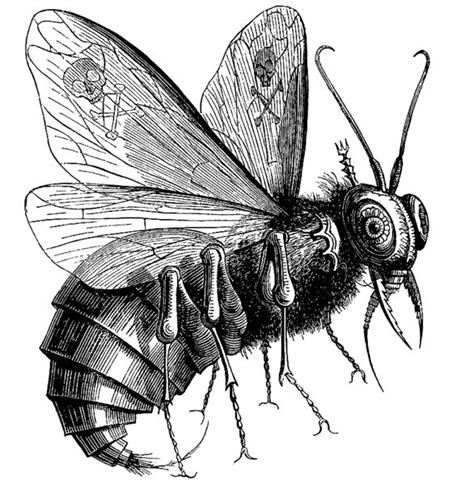 |
|
he ki hokoou te ariki a
Hotu.kia Teke. raua ko |
Then King
Hotu said to Teke and Oti [raua ko oti], 'You
two will forget [hoki ku ngaro] what I have
said [ana te ki] (i.e., you will keep it a
secret)?' Teke answered [he hakahoki], 'Yes!
[ee]' |
|
oti. hoki ku ngaro ana
te ki nei eko rua aruru(-) |
|
a.he hakahoki mai a
Teke.ee.he ki hokoou mai |
|
te ariki a Matua.kia
Hotu.ana oho koe e too |
Again King
Matua spoke to Hotu, 'When you leave you shall take
the prisoners (tangata kopu) along to work
the land!' |
|
tokoa.te tangata
kopu.mo keukeu o tou
kainga |
| Keu.
Communal enterprise, work done in common: mo
te keu. for the work done in common (for
instance: collecting food mo te keu, to give
to the helpers). Keukeu: 1. To work; to work
long and steadily: he-keukeu te aga; tagata
keukeu henua, farmer. 2. To get ready, e.g. for
a trip: ka-keukeu koe, ki oho tâtou. get
ready, we are going; ka-keukeu ki turu ki tai, ki
hî, get ready for going down to the sea, to
fish. 3. To approach (of rain): he-keukeu te ûa.
Vanaga. |
|
E:58 → 2 * 29 |
|
he ki hokoou a Hotu.kia
Teke.raua ko oti. |
Then Hotu
said to Teke and Oti, 'Gather your things together!'
He also talked to the master shipbuilder (maori
tuku miro), to Nuku Kehu, 'Is the canoe ready to
be launched'
Nuku Kehu replied, 'Yes!' [ee] |
|
ka
hakatakataka korua
mee.he ki tokoa |
|
ki te maori.tuku miro
tokoa.ko nuku kehu |
|
hoki
ko oti ana te
miro.(?)e tuku he ki mai |
|
a Nuku kehu.ee.he ki
hokoou te ariki |
|
Teke.
Occiput. Teketeke, short (not tall); also:
teke. Vanaga. Teke ki nei, as far as,
until (? tehe 1). Teketeke, crest,
ridge. Churchill.
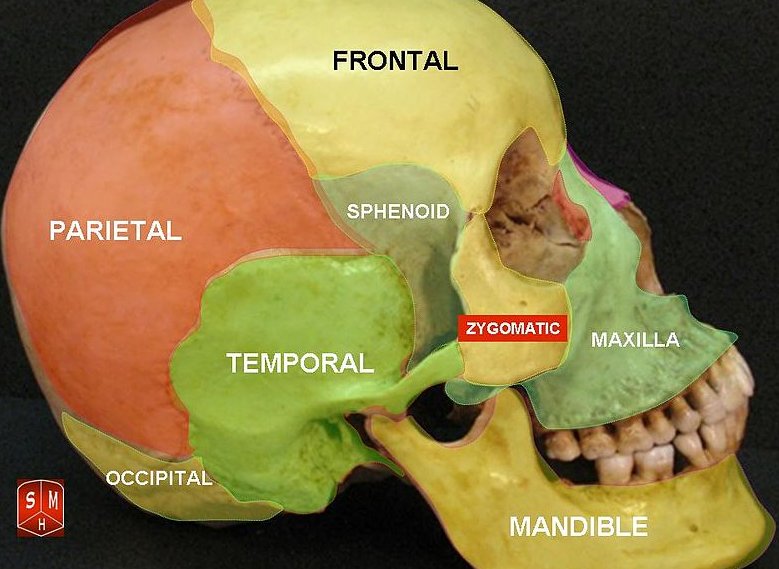
Oti. To come
to an end; to suffice, to be enough: ku-oti-á,
it is finished; ina kai oti mo kai, there
is not enough to eat; he-oti á, there isn't
anymore left, it's the last one; it's enough with
that. Vanaga. Ta.: 1. Oti, presage of death.
Sa.: oti, to die. 2. To cut. Mq.: koti,
oti, id. Sa.: 'oti, id. Ma.: koti,
id. Churchill.
Taka.
Taka,
takataka. Circle; to form circles, to
gather, to get together (of people). Vanaga. 1. A
dredge. P Mgv.:
akataka, to fish all day or all night
with the line, to throw the fishing line here and
there. This can only apply to some sort of net used
in fishing. We find in Samoa
ta'ā a small
fishing line, Tonga taka the short line
attached to fish hooks, Futuna taka-taka a
fishing party of women in the reef pools (net),
Maori takā the thread by which the fishhook
is fastened to the line, Hawaii kaa in the
same sense, Marquesas takako a badly spun
thread, Mangareva takara a thread for
fastening the bait on the hook. 2. Ruddy. 3. Wheel,
arch; takataka, ball, spherical, round,
circle, oval, to roll in a circle, wheel, circular
piece of wood, around; miro takataka, bush;
haga takataka, to disjoin; hakatakataka,
to round, to concentrate. P Pau.: fakatakataka,
to whirl around. Mq.: taka, to gird. Ta.:
taa, circular piece which connects the frame of
a house. Churchill. Takai, a curl, to tie;
takaikai, to lace up; takaitakai, to
coil. P Pau.: takai, a ball, to tie. Mgv.:
takai, a circle, ring, hoop, to go around a
thing. Mq.: takai, to voyage around. Ta.:
taai, to make into a ball, to attach. Churchill.
Haga takataka, to disjoin. Miro
takataka, bush. Churchill.
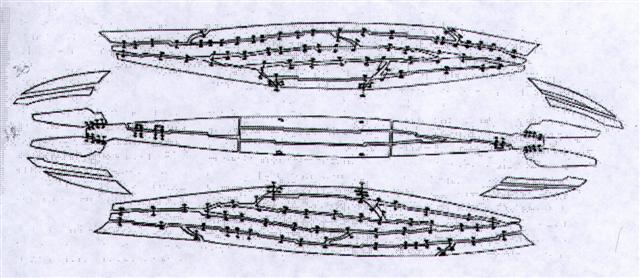 |
|
ana oti te miro ka hoa
ki haho ki te tai. |
Then the
king said, 'If the canoe is ready [ana oti te
miro], then put it into the water!' [ka hoa
ki haho ki te tai] Nuku Kehu
said to all his assistants [ki toona titiro anake],
'Let's go, let's put the canoe into the water
because this is what the king has said.' [e
e kī mai
nei te ariki]
They took hold of the canoe and pushed it toward the
sater; it moved, and they pushed it out into the sea
[ki haho ki te tai]. |
|
he ki a Nuku kehu.ki
toona titiro.anake. |
|
a(m)ua tatou ki te miro
ki hoa ki haho ki te |
|
tai.e e kī mai nei te
ariki. |
|
he too mai i te miro he
tono he oho.he hoa |
|
ki haho ki te tai. |
|
Haho. Outside. Vanaga. Hahoa (ha
causative, hoa) to cut, to wound, to hurt. PS
Mgv.: tahoa, to make papyrus by beating. Sa.:
foa, to chip, to break. To.: foa, to
crack, to make an opening. Fu.: foa, to dig,
the rent in a mat. Underlying the Nuclear Polynesian
significations the primal sense seems to be that of
a hole. The Rapanui, a causative, is a clear
derivative in the cutting sense; wound and hurt are
secondary withing this language. The Mangarevan
composite means 'to beat until holes appear', which
is a distinctive character of the beaten bast of the
paper mulberry in the condition in which it is ready
for employment in making tapa. Churchill.
... He cleared the trunks of
their branches and bark, hewed them into shape, and
with strong fau ropes he and his men drew
them down the valley over cliffs and ravines,
seeming to feel it merely light work. Thus King
Puna was robbed of his fine aha-tea tree,
his mara-uri tree, a toi (Alphitonia)
tree, and a hauou (pua, Fagraea)
tree; and Hiro spared not the trees sacred to
the gods around the marae. He cut down a
great tamanu (Callophylum), stripped
the trunk of its branches and bark, split it up for
planks for the bows of his canoe, and trimmed the
branches for outriggers and crossbeams. He cut down
a most sacred miro (Thespesia) tree
for planks for the after part of his canoe, and he
took two tall straight breadfruit trees for planks
for the deck houses. Then he went into the woods and
cut down straight fau trees (Hibiscus
tiliaceus) for paddles and for floor planks, and
three slim hutu (Barringtonia) trees
for masts. After all this depredation, Hiro
and his men helped themselves to wood and thatch and
reeds and all other material needed for a shed in
which to build the canoe and for rollers to place
under it, King Puna not daring to oppose
them, as Hiro was too powerful and dangerous
to vex ... Amid all the required ceremonies and
prayers and good omens, they set to work. On rising
ground they erected a great shed thirty fathoms
long, six wide, and five fathoms high, facing the
sea endwise. The builders had their baskets of axes
and adzes of stone, gimlets of coconut and sea
shells, and sennit of fine tight strands, prepared
and consecrated to the god Tane for this
special purpose. Hiro marked out the keel,
the knees, the beams, and the planks, and the men
cut them into shape. All the material for the work
was carefully sorted and handily placed in the shed,
Hiro passing it to the men as they required
it ... They set the keel of avai, toi,
and mara wood, polished and firmly spliced
together with hard spikes of wood secured with
sennit, upon rollers in the shed and painted it with
red clay mixed with charcoal so as to preserve it
from wood borers. Then they fastened the knees onto
the keel with spikes and sennit. Holes were bored
into the keel and planks at even distances apart,
and the men set to work in the following order: Hotu,
the chief of Hiro's artisans, worked on the
outer side to the right of the canoe, and Tau-mariari,
his assistant, worked on the inner side; Memeru,
the royal artisan of Opoa, worked on the
outer side to the left of the canoe, and his
assistant, Ma'i-hae, worked on the inner
side. Each couple faced each other, fixing the
planks in their places and drawing the sennit in and
out in lacing the wood together; and the canoe soon
began to assume form, the bows facing the sea. To
make work light they sang ... Every seam and all the
little holes in the wood from the keel and upwards
were well caulked with fine coconut-husk fiber and
pitched carefully with gum, which Hiro drew
from sacred breadfruit trees of the marae,
and when all the streaks were on the canoe was
washed out clean and dried well and painted inside
and outside with red clay and charcoal. As the hull
of the canoe reached almost to the roof, the
builders could work no longer within the shed, and
so they broke it away. Then the boards of the deck
were set upon the beams and fixed in place with
spikes and sennit, and the ama or outrigger
of tamanu wood, which had been well steeped
in water to preserve it from borers, was polished
with limestone and firmly lashed with sennit on to
the left side of the canoe, the upper attachment of
wood forming across each end of the canoe a beam,
called 'iato, and lashed on to the right side
in the same manner as on the left side ... Next came
the finely carved towering ornaments for a reimua
(neck-in-front, the figurehead) and a rei muri
(neck-behind, stern ornament), which were fastened
on to their respective places, and they were named
Rei-fa'aapiapi-fare
(Necks-filling-up-the-house), because the shed was
broken away to allow placing them and finishing the
canoe. The two deck houses, called oa mua and
oa muri (fore house and aft house), were then
set in their places and thatched with fara
leaves, after which Hotu, the chief artisan,
cut out the holes in the deck and down in the keel,
in which he stood the three masts, before mentioned,
which had been steeped in water, well seasoned,
dried, and polished. The the canoe was completed.
Hiro dedicated it to Tane, naming it
Hohoio (Interloper) … Finally the day arrived
for launching the canoe, and a great multitude
assembled to see the wonderful sight. The props were
removed from the sides of the canoe, and the men
held it ready to launch over the rollers. Hotu
invoked the gods Ta'aroa, Tane,
'Oro, Ra'a, Ro'o, and Moe,
to their aid, and soon their presence was felt
impelling the canoe. The rollers began to move, and
then the canoe went forwards, slowly at first as the
men's hands steadied it and then swiftly and well
poised as it gracefully descended alone and sat upon
the sea, which rose in great rolling waves caused by
a wind sent to meet it by the aster Ana-mua
(Antares in Scorpio), the parent pillar of the sky.
The spectators greatly admired Hiro's ship
and raised deafening shouts. Then the canoe was made
to drink salt water; it was dipped forwards and
backwards in the waves of the great moving altar of
the gods and thus consecrated to Tane. A
marae was made for him in the little house aft
of the deck, and the three masts were rigged with
ropes and strong mats for sails and long tapa
pennants streaming from them ... Within a few days
the canoe was loaded with provisions. Great fish
baskets were made of bamboo, filled with many kinds
of fish, and attached to the outside of the canoe so
as to be in the water. Bamboos and gourds were
filled with water and stowed away on board, and
there were fe'i, bananas, taro, and mahi
(fermented breadfruit) in abundance. A bed of sand
and stones was made upon the deck, upon which to
make a fire for cooking the food, and soon Hiro
was ready to go to sea. Hiro was the captain
and pilot, and he had other competent seamen, who
like him were acquainted with the heavenly bodies
and their rising and setting. Women and children
also accompanied their husbands and fathers on
board, and on one fine day, with a strong favorable
wind, they set sail, applauded by many spectators,
among whom were prisoners of war (called tîtî),
whose shouts were heard above all others. They saw
Hiro's great pahi sail out to sea and
disappear beyond the horizon, never again to return
to Tahitian shores ... |
|
he oho.a Teke.raua ko
oti.ko toraua titiro |
Teke, Oti,
and their assistants [toraua titiro] went on.
Teke secretly told his assistants, 'Later during the
night you are to go (there) and dig up the yams of
my (classificatory) brother (tangata taina)
Maeha. When you have dug out all the big and small
roots, so that nothing is left in the soil (? ka
paepae tahiro) ... |
|
tokoa, he nave e
Teke.ki toona titiro.ani(-) |
|
ra.i te po.e oho korua
e tuu. e keri i te |
|
uh(i) era o tooku
tangata taina era.a Maeha |
|
ana keri korua rua nui
rua iti ka paepae. |
In Manuscript E the master shipbuilder was named Nuku Kehu
and we can guess he probably was an alias for Mercury (Ohiro)
- the creative god of thieves hidden in the night which was
numbered 29.

Hiro. 1. A deity invoked when praying for rain (meaning uncertain). 2. To twine tree fibres (hauhau, mahute) into strings or ropes. Ohirohiro, waterspout (more exactly pú ohirohiro), a column of water which rises spinning on itself. Vanaga. To spin, to twist. P Mgv.: hiro, iro, to make a cord or line in the native manner by twisting on the thigh. Mq.: fió, hió, to spin, to twist, to twine. Ta.: hiro, to twist. This differs essentially from the in-and-out movement involved in hiri 2, for here the movement is that of rolling on the axis of length, the result is that of spinning. Starting with the coir fiber, the first operation is to roll (hiro) by the palm of the hand upon the thigh, which lies coveniently exposed in the crosslegged sedentary posture, two or three threads into a cord; next to plait (hiri) three or other odd number of such cords into sennit. Hirohiro, to mix, to blend, to dissolve, to infuse, to inject, to season, to streak with several colors; hirohiro ei paatai, to salt. Hirohiroa, to mingle; hirohiroa ei vai, diluted with water. Churchill. Ta.: Hiro, to exaggerate. Ha.: hilohilo, to lengthen a speech by mentioning little circumstances, to make nice oratorial language. Churchill. Whiro 'Steals-off-and-hides'; also [in addition to the name of Mercury] the universal name for the 'dark of the Moon' or the first day of the lunar month; also the deity of sneak thieves and rascals. Makemson.
| 59 |
 |
520 |
 |
481 |
 |
270 |
 |
| Ab1-1 |
Ab7-26 |
Aa5-7 |
Aa8-26 |
| 580 = 20 * 29 |
754 = 26 * 29 |
Kehu (cfr ehu). Hidden; what cannot be seen
because it is covered; he-kehu te raá, said of the sun
when it has sunk below the horizon. Vanaga. Kehu,
hakakehu, to hide, disguise, feint, feign, to lie in wait.
Kekehu, shoulder G. Churchill.
Keke. To go down after reached its zenith (of the sun):
he-keke te raá. Kekeé, to be lying on the ground,
partly above it, to stick out: ma'ea ke'e ke'e, stones
sticking out of the ground. Kékekéke, to rustle, to
creak: ku-kekekeke-áte hare i te to kerau, the house
creaked in the wind. Kekepu, animal mentioned in ancient
traditions, the flesh of which was eaten in Hiva (also
kepukepu). Kekeri, to feel an indisposition of the
stomach or the bowels: he-kekeri te manava. Kekeú,
shoulder (according to others, shoulder-blade); used also for
'arm'. Vanaga. Keke (ke), other, distinct,
special; hikohiko keke, hide-and-seek; kekee (ke),
irregular, uneven, rough; ke avai, a superlative
expression; hinihini ke avai, ancient; ika ke avai,
abuse; kori ke avai, abuse; maori ke avai,
skilful, handy; pipiro ke avai, disgusting odor; tupu
ke avai, of swift growth; ua ke avai, a shower of
rain. Keekee; niho keekee, long protruding teeth.
Churchill. Pau.: keke, armpit. Mgv.: keke, id.
Ta.: ee, id. Mq.: kaáke, id. Ma.: keke, id.
Churchill. Mgv.: keke, to praise, to felicitate. Sa.:
'e'e, to pay respect to. Ha.: ee, caressing, kind.
Kekei, sharp, harsh, of the voice. To.: keke, to
bleat. Ha.: eeina, to creak, to grate. Churchill.
... For instance can we when reading at the
beginning of page E:57 perceive words which relate to the path
of the Sun - he mee o rehu (don't forget),
te kekepu tokoa (also
the 'kekepu creatures'), he
ngaro tou piere (your people will vanish) .... At the time of the immigration, Hotu Matua brought with him
an animal that had short front legs and fat, high buttocks ...

... The etymology of kangaroo (cfr he ngaro -
disappear) is not known, which allows
me to imagine a connection with Tagaroa (Kanaloa).
The Polynesians surely visited Australia on several occasions
and the striking pocket (little sack) on the front side of the
man-sized kangaroos (standing on 2 legs just like men), must
have stayed in their memories. Nothing on land can be more
illustrative of how life must have begun inside a dark sack (taga)
...
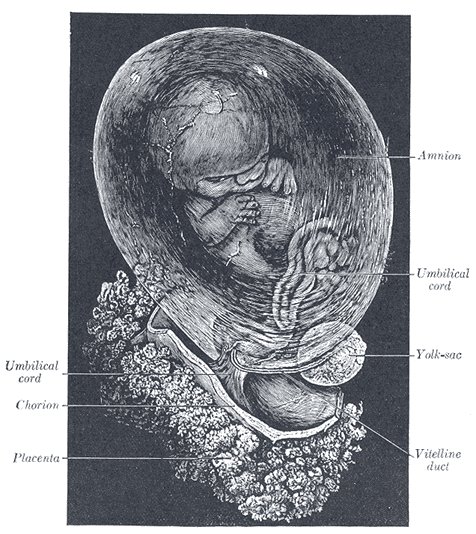
|











